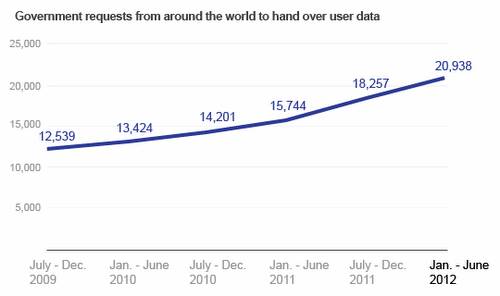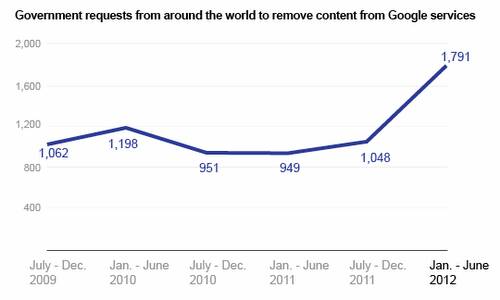Government Surveillance Is On The Rise, Google Confirms
By Countercurrents.org
14 November 2012
Countercurrents.org
Surveillance on citizens is on the rise. It's not a single-country trend. It's a global phenomenon. A Google report confirms the all encompassing power of rule.
Brian Womack writes [1]:
Google Inc. said government requests to remove content from its search results and other services rose 71 percent in the first half of the year, according to a new report.
Google said there were 1,791 requests in the six months through June, up from 1,048 during the last six months of 2011, according to its Transparency Report. Turkey 's government made 501 requests to remove content, up from 45 in the previous period, while the US followed with 273, up from 187.
Google is under scrutiny from companies and governments around the world over what type of content it shows. Some countries are being more aggressive in seeking content removal from search results and sites such as video-sharing service YouTube. While the company may receive such requests, Google may choose not to comply, according to the report.
“We think it's important to shine a light on how government actions could affect our users,” Dorothy Chou, senior policy analyst at Google, said in the report. “The number of government requests to remove content from our services was largely flat from 2009 to 2011. But it's spiked in this reporting period.”
Shares of Mountain View, California-based Google declined less than 1 percent to $662.39 as of 2:47 p.m. in New York . The stock had advanced 3.1 percent this year as of yesterday's close.
Court Orders
In Turkey , the company received requests to take down content related to alleged criticism of the government, national identity and the republic's founder, Mustafa Kemal Ataturk, according to the report. Google also received petitions concerning blogs discussing minority independence and those that disclose details about the private lives of politicians. Turkey has in the past taken action against Google's YouTube and Internet service providers for such content.
In Germany , Google complied with a court order to remove eight search results that linked to sites allegedly defaming a politician's wife. In France , Google removed search results that allegedly violated the privacy of an individual because of a court order, the report said. Germany made 247 requests to remove content, up from 103, and France made 72, up from 31.
Google also said government surveillance is on the rise, with demands for user data increasing again in the first half of 2012. There were 20,938 requests for such information, up 15 percent from the second half of 2011.
The US had the most user data requests at nearly 8,000, up 26 percent from the previous period. That was followed by India with 2,319 and Brazil with 1,566.
Dorothy Chou, Senior Policy Analyst, Google, wrote [2] in a blog posted on November 13:
We think it's important to shine a light on how government actions could affect our users. When we first launched the Transparency Report in early 2010, there wasn't much data out there about how governments sometimes hamper the free flow of information on the web. So we took our first step toward greater transparency by disclosing the number of government requests we received. At the time, we weren't sure how things would look beyond that first snapshot, so we pledged to release numbers twice a year. Today we're updating the Transparency Report with data about government requests from January to June 2012.
[O]ne trend has become clear: Government surveillance is on the rise. As you can see from the graph below, government demands for user data have increased steadily since we first launched the Transparency Report. In the first half of 2012, there were 20,938 inquiries from government entities around the world. Those requests were for information about 34,614 accounts. 
The number of government requests to remove content from our services […] spiked in this reporting period. In the first half of 2012, there were 1,791 requests from government officials around the world to remove 17,746 pieces of content. 
You can see the country-by-country trends for requests to hand over user data and to remove content from our services in the Transparency Report itself, but in aggregate around the world, the numbers continue to go up.
The information we disclose is only an isolated sliver showing how governments interact with the Internet, since for the most part we don't know what requests are made of other technology or telecommunications companies.
[M]ore companies like Dropbox, LinkedIn, Sonic.net and Twitter have begun to share their statistics too. Our hope is that over time, more data will bolster public debate about how we can best keep the Internet free and open.
The email accounts of Generals David Petraeus and John Allen aren't the only ones being targeted by the feds. Google published statistics from their latest analysis of requests from governments around the globe this week, and the findings show that it is hardly just the inboxes of the Pentagon's top-brass that are being put under the microscope.
From January through June, the US government filed more than 16,000 requests for user data from Google on as many as 7,969 individual accounts, the report shows.
The company notes that “The number of requests we receive for user account information as part of criminal investigations has increased year after year,” but says that it doesn't necessarily mean it's the government that's ramping up the acceleration into a full-blown surveillance state.
For all of those requests in the US , Google says they complied with the government's demands 90 percent of the time; but while it seems like a high number, that figure actually constitutes the smallest success rate the feds have had since Google began tracking these numbers in 2010.
In a separate report published earlier this year by the Electronic Frontier Foundation, a San Francisco-based advocacy group, awarded Google high praise for doing more than other industry titans in terms of letting feds force them into handing over information without good reason, citing specifically their efforts — albeit unsuccessfully — in handing over user info to the Justice Department during the start of its ongoing investigation into WikiLeaks.
Of the 20,938 user data request sent from governments around the globe, the US came in first with the number of demands at 7,969, with India at a distant second with 2,319 requests. The US government's success rate in terms of getting that information trumps most every other country, however, with full or partial compliance on the part of Google rarely exceeding 70 percent.
In the report, Google says it's more than just surveillance of individual users that is on the rise. The US has also been adamant with censoring the Web, writing Google five times between January and June to take down YouTube videos critical of government, law enforcement or public officials. In regards to the five pleas to delete seven offending videos, Google says, “We did not remove content in response to these requests.”
The company was more willing to side with authorities in other cases, though, admitting to taking down 1,664 posts from a Google Groups community after a court order asked for the removal of 1,754 on the basis of “a case of continuous defamation against a man and his family.” Google also followed through with around one-third of the requests to remove search results that linked to websites that allegedly defamed organizations and individuals (223 of the 641 pleas) and say “the number of content removal requests we received increased by 46% compared to the previous reporting period.”
According to the report, Google only received one request from the US government to remove a video from YouTube on the grounds of ensuring “national security” but does not disclose the results of that plea. No further information is available in the report as to what the government demanded removed, but in the immediate aftermath of the September 11, 2012 terrorist attack in Benghazi originally blamed by many on an anti-Islamic video clip linked to a California man, Google rejected demands from the US to delete the ‘Innocence of Muslims' from YouTube.
That isn't to say that Washington is responsible for the bulk of the demands that end up on the desks of Google's administrators. The report notes Google has received requests to remove search results that link to sites that host alleged copyright-infringing content more than 8 million times in just the last month, with more than 32,000 websites being singled out by the materials' respective owners. Taking into account the last year and a half, the Recording Industry Association of America (RIAA) — the largest trade-group representing the US music industry — asked Google to stop linking to roughly 4.5 million URLs that they say hosted illegal content.
Last month, the Supreme Court heard arguments
to decide whether or not a case can go forth that will challenge the FISA Amendment Act of 2008, an update to the Foreign Intelligence Surveillance Act that allows the government to eavesdrop on emails sent as long as one of the persons involved is suspected of being out of the country. When asked earlier in the year to give an estimate of how many Americans have their electronic communications wiretapped by the National Security Administration, the inspector general of the NSA declined to issue a response, even to members of the Senate Intelligence Committee.
According to statements made by NSA whistleblower Bill Binney at the Hackers On Planet Earth (HOPE) conference in New York this year, the US government is “pulling together all the data about virtually every US citizen in the country and assembling that information, building communities that you have relationships with, and knowledge about you; what your activities are; what you're doing."
Source:
[1] Bloomberg, “Google Says Governments Requesting More Content Removals”, Nov 14, 2012 , http://www.bloomberg.com/news/2012-11-13/google-says-governments-requesting-more-content-removals.html
[2] “Insights from Googlers into our products, technology and the Google culture”, November 13, 2012 , http://googleblog.blogspot.com/2012/11/transparency-report-government-requests.html
[3] http://rt.com/usa/news/google-government-us-report-617/
Comments are moderated


